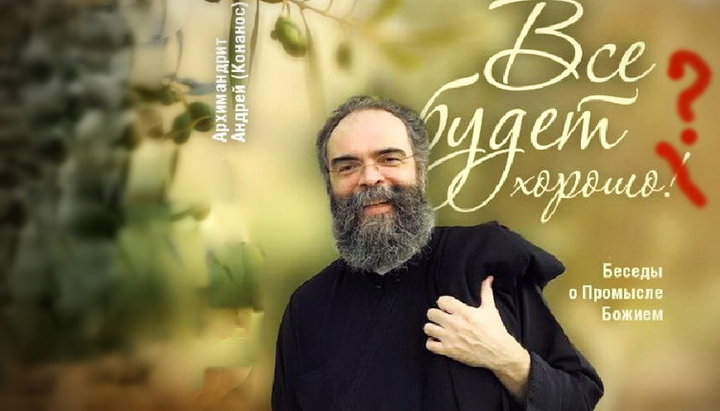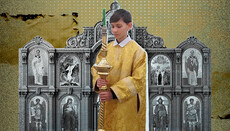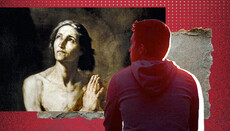Love does not command our denying the reality of sin

There is no man without sin. But the fall of our neighbor, like our own, can serve as a saving awareness of our extreme weakness and the need to trust in God.
The fall of the famous preacher Andreas Konanos, who announced that he was renouncing the sacred rank, provoked a stormy reaction throughout the Orthodox world. Someone hastened to notice that this is what they had expected from the "liberal" pastor, in their opinion, someone, on the contrary, began to express their vehement support to him, reproaching opponents for lack of love and understanding. Many simply grieve over this fact, especially those for whom his books were important.
What can be said in this situation? In short, love does not require us to deny the reality of sin. Father Andreas sinned – let's hope for his repentance. To pretend that there is no sin here is to harm both him and ourselves.
The Christian life is a path of spiritual growth, which is often very complex, rough and confusing. Christians show imperfection and may experience severe moral declines. "If we claim to be without sin, we deceive ourselves and the truth is not in us" (1 John 1:8).
The fall of our neighbor, like our own, can serve as a saving awareness of our extreme weakness and the need to trust in God.
Manifestations of sin and infirmity as such do not yet take us beyond the covenant with God. God knew from the beginning who he was messing with. He will have enough patience.
A Christian is by no means a sinless person. We will find the sinless only in heaven. Manifestations of sin and infirmity as such do not yet take us beyond the covenant with God. God knew from the beginning who he was messing with. He will have enough patience.
What is behind the fence of the Church? Reluctance to acknowledge our responsibilities and our failures. If we acknowledge that we have failed, that the sickness and depravity of sin is deeply ingrained in us and continues to affect our actions, God always has forgiveness and help for us. "If we confess our sins, he is faithful and just and will forgive us our sins and purify us from all unrighteousness" (1 John 1:9). It is another thing if we refuse to confess our sins and admit failures as failures. If we seek approval for our sins rather than forgiveness.
Alas, this is a common problem of a fallen person. God offers him forgiveness of sins. All sins, whatever they are – heavy, long and ingrained. As the Prophet says, “I have swept away your offenses like a cloud, your sins like the morning mist. Return to me, for I have redeemed you” (Isaiah 44:22). But man does not accept forgiveness. Man requires approval. We do not want to admit that we are wrong before God – we demand that God admit that he was wrong before us.
Can God forgive the renouncement of priesthood? Yes. Like all the sins that led to this decision. But for this, sin must be confessed, i.e. recognized as a sin. It is bitter and frightening to fall into sin. But to fall into sin is not the end of the Christian life, and Christ never tires of forgiving when we confess our sins to Him. But to rest on the fact that this is not a sin at all means to go into outer darkness.
Can God forgive the renouncement of priesthood? Yes. Like all the sins that led to this decision. But for this, sin must be confessed, i.e. recognized as a sin.
Therefore, it is not that the famous preacher has fallen that is particularly disturbing – there is nothing new or unusual about our damaged nature. The trouble is that both his own voice and many other voices suggest that this is not a fall at all but just a new stage in his life.
Who are we deceiving? This is exactly the fall.
There is nothing more important in the world than priesthood. The priest acts as a representative of Christ, His icon; Christ forgives sins with his mouth and offers His Body and Blood with the priest’s hands. The priest is called to be "an example for the believers in speech, in conduct, in love, in faith and in purity" (1 Timothy 4:12), he follows Jesus, who speaks of himself “I am the good shepherd. The good shepherd lays down his life for the sheep. The hired hand is not the shepherd and does not own the sheep. So when he sees the wolf coming, he abandons the sheep and runs away. Then the wolf attacks the flock and scatters it. The man runs away because he is a hired hand and cares nothing for the sheep” (John 10:11-13).
The martyrs, ancient and new, agreed to great afflictions and cruel death, if only not to leave their ministry. In the liturgical calendar of the Church, we remember people who were ordained to the priesthood in the 1930s, when it meant almost certain death. Many of these priests were, in fact, shot or died in the camps. The Greek Church also has a history of martyrdom – people knew that when they became priests, they were ready to die.
Being a priest is not easy. And the famous priest, who leaves his ministry even without being tortured by poverty or hard work, weakens the hands of his brothers.
To abandon one's ministry not even under the influence of some mortal threat is a great sin. Father Andreas' flock was not confined to his parishioners in Greece, he had an influence on lots of people around the Orthodox world. His decision inflicted wounds on the sheep that he was called to care for.
There is no doubt that he can be forgiven – but for this to happen the sin must be confessed as sin.
Being a priest is not easy, especially where the Church is facing hostile pressure. But even where the Church is not persecuted, pastoral ministry requires great sacrifice. And the famous priest, who leaves his ministry even without being tortured by poverty or hard work, weakens the hands of his brothers.
To show understanding and compassion for a sinner given that we are all weak and close to falling is one thing, to approve of sin is quite another. To approve of sin is even worse than to commit it. As the Apostle Paul writes of the Gentiles, "Although they know God’s righteous decree that those who do such things deserve death, they not only continue to do these very things but also approve of those who practice them" (Rom. 1:32). At first glance, this may seem strange, but it is true: a person can sin under the pressure of some difficult circumstances. When another person, looking from the side, justifies his action that has no such mitigating circumstances, he freely takes the side of sin.
Therefore, it is particularly awful when people write that the act of Father Andreas is "honest".
The secular notion of "honesty" or "loyalty to oneself", when it is considered "honest", for example, to dump a disgusted wife instead of keeping the marriage, is just a devilish lie and a lie having several levels.
When we hear about being "loyal to ourselves", it's most often about our "being loyal" to the worst in us.
To what "self" is it supposed to be true? We have different aspirations. The drunkard, deep down, would like to lead a sober, honest, dignified life – but he also has a painful urge to get drunk, which makes him beg for trifles at the store. The fornicator in his heart would like to have faithful and devoted love like all people. But the desire to get at least some consolation on the spot overpowers. A person who has already got to know faith has the same problems: the desire to please God and grow in holiness struggles with the whole complex of small desires, grievances and fears living in our fallen nature. When we hear about being "loyal to ourselves", it's most often about our "being loyal" to the worst in us.
Honesty, by definition, is our ability to justify other people's trust. There is nothing "honest" about the betrayal of such trust.
Therefore, we must by no means deny that sin is sin. However, it is important to bear in mind the words of the Apostle: “Brothers and sisters, if someone is caught in a sin, you who live by the Spirit should restore that person gently. But watch yourselves, or you also may be tempted” (Galatians 6:1).
The bitterness and anger caused by the fall of your brother may be completely understandable, but we must not succumb to it. We should not resent people who have reacted to this shocking news in the wrong way. We all endure this blow differently.
Let us pray for the repentance of all the fallen and stand firm in the truth, which does not change or waver due to the unfaithfulness of some of us.












